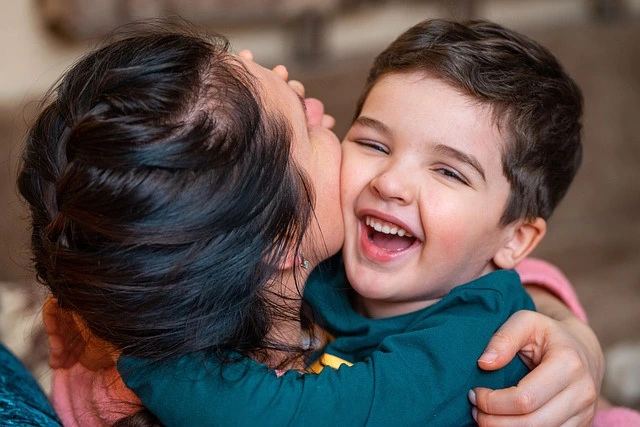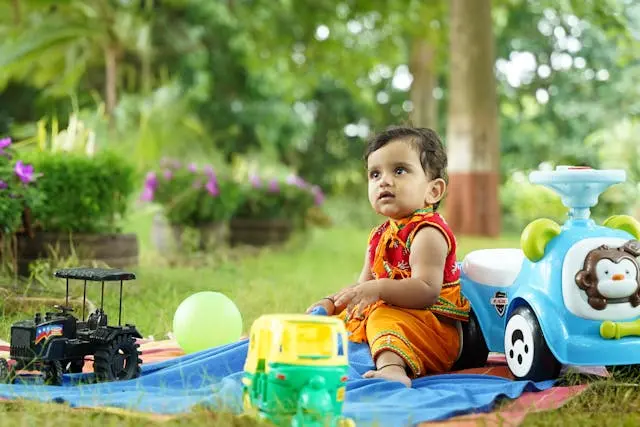It’s no secret that most moms, including myself, have found themselves pondering over the multitude of different parenting styles available today. The fascination with these various approaches isn’t new, and all for good reason. Since most of these parenting styles have been popular for quite some time, it’s also true that they hold significant sway over families’ and children’s development. In this guide, together with me, you are setting foot on a journey to explore every bit of information on different parenting styles and their profound effects.
Whether you’re a first-time mother beating the struggles of parenthood or a seasoned parent seeking fresh insights, I aim to equip you with a deeper understanding of each style’s pros and cons and also with some examples that might help you on the way. By doing so, I hope to empower you to make choices that resonate with your family’s unique values and goals. Let’s get started and address the complexities of parenting styles together.
Various Parenting Styles
- Attachment Parenting
- Free Range Parenting
- Coercive Parenting
- Laissez-Faire Parenting
- Manipulative Parenting
- Helicopter Parenting
- Tiger Mother Parenting
- Authoritarian Parenting Style
- Permissive Parenting Style
- Neglectful Parenting Style
- Snowplow Parenting
Different Parenting Styles

As I bring forth the different types of parenting as well as their characteristics and pros and cons to each style, every parent be it a new mom or dad, or an experienced parent seeking to further their skills will benefit from my guide. Some of the popular types of parenting include;
Attachment Parenting
This type of parenting highlights the bonding method between parents and children. The connection between the two is mostly based on continuous nurturing and physical attachment via extreme closeness. Attachment Parenting is one of the parenting approaches that encourage the parent to respond to their children’s needs intuitively. This way, the bond between them transforms into an emotional one.
Example
A parent practicing this method might wear a baby carrier throughout the day while doing household chores, enabling the baby to feel the warmth and heartbeat of the parent, and enhancing emotional and physical security.
Pros:
- Strong Bonding: Attachment parenting builds deep emotional connections through practices like co-sleeping and babywearing.
- Quick Response: Parents respond promptly to their child’s needs, fostering better communication and trust.
- Improved Communication: Attachment parenting encourages healthier communication patterns between parents and children.
- Emotional Regulation: Children learn to regulate emotions effectively, enhancing resilience and coping skills.
- Confidence: Secure attachment fosters confidence and independence in children.
Cons:
- Burnout: Attachment parenting demands significant time and energy, leading to parental burnout.
- Boundary Challenges: Meeting needs promptly can make it difficult to establish boundaries and discipline.
- Time Demands: Attachment parenting requires a substantial time commitment from parents.
- Social Criticism: Practices may face criticism from those with different parenting beliefs.
- Feasibility: Attachment parenting may not be feasible for all families due to various factors.
Free Range Parenting

Instilling independence and self-reliance in children are two major characteristics of free-range parenting. With more types of parenting getting popular by the year, free-range parenting seems to be in rotation for quite some time now, all for good reasons. This approach lets kids be on their own and explore the world at their will with less supervision and more freedom.
Example
A free-range parent would hence allow their child to roam about in a nearby park without constant supervision trusting them to be safe and guided on their own. This will boost a child’s confidence in themselves leading to better problem-solving and also preparing for real-world challenges with much practise from a young age.
Pros:
- Boosts Confidence: Free-range parenting allows children to explore independently, boosting their confidence.
- Enhances Problem-Solving Skills: Children develop strong problem-solving skills as they navigate challenges on their own.
- Fosters Independence: Free-range parenting fosters independence and autonomy, preparing children for adulthood.
- Develops Resilience: Overcoming obstacles in a supervised environment helps children develop resilience.
- Encourages Exploration: Free-range parenting promotes physical activity and exploration, fostering curiosity.
Cons:
- Safety Concerns: Allowing freedom may expose children to safety risks like traffic or strangers.
- Misjudgment by Child: Children may misjudge risks, leading to accidents.
- Legal and Social Scrutiny: Free-range parenting may face legal or social scrutiny.
- Misinterpretation of Neglect: Practices may be misinterpreted as neglect.
- Stress for Parents and Children: Parents may feel anxious, and children overwhelmed, in unfamiliar situations.
Coercive Parenting
Termed as a dark side to different styles of parenting, some parents find this approach to be successful in managing children, some others might feel it manipulative. The coercive parenting approach tends to control a child and his behavior through forceful practices that might even involve threats. Emotional needs are often disregarded as harsh disciplining with a lack of empathy which also might get verbally abusive at times. A coercive parent will most likely to use fear as a tool of parenting and managing a child to comply with the parent’s needs. Eventually, this approach will tire off both parties and end up raising a child with low self-esteem, and anxiety, and may face difficulties in forming healthy relationships.
Example
A coercive parent might threaten to take away a beloved toy or cancel a playdate if a child does not finish homework or chores to the parent’s satisfaction. This use of threats to enforce compliance often results in the child feeling constantly anxious about meeting demands to avoid punishment, impacting their emotional well-being.
Pros:
- Might be suitable occasionally due to uncontrollable behavior in children: In certain circumstances, physical discipline might be seen as necessary to address immediate safety concerns.
Cons:
- Negative Impact on Child’s Emotional Well-being: Physical discipline can lead to feelings of fear, insecurity, and low self-worth in children.
- Potential for Long-term Psychological Harm: Research suggests that physical discipline can contribute to long-term psychological issues, including increased aggression and anxiety.
- Hinders Trust and Healthy Relationships: Physical discipline erodes trust between parent and child, damaging the parent-child relationship.
- Increases Risk of Aggressive Behavior: Children who experience physical discipline are more likely to exhibit aggressive behavior themselves.
- Undermines Autonomy and Self-esteem: Physical discipline teaches obedience out of fear, undermining a child’s autonomy and self-esteem.
Laissez-Faire Parenting

Those parents who might be busy and have limited time to spare for their kids or prefer to give minimal guidance or rules may opt for a Laissez-Faire parenting style. With higher levels of freedom at hand, children sought to make their own decisions and learn from their mistakes on their own. Children who do their work being watched or not is a great example. This type of child often gets to decide when they’d do their homework, what they’ll eat for their next meal, or when to go to bed. All these behaviors will lead to much independence and will give children the opportunity to face any hurdle in life with less effort. The bond between parents and children will be much better compared to some other parenting styles. However, parents might not get to have a say in these children’s decisions.
Example
Consider a 12-year-old whose parents follow this hands-off approach. The child chooses to spend an afternoon playing video games before starting on a school project. Learning the consequences of procrastination firsthand, the child decides to adjust their schedule the next day to prioritize schoolwork, demonstrating the ability to manage their own time and responsibilities without direct parental intervention.
Pros:
- Encourages Independence: Unschooling empowers children to control their learning, fostering independence.
- Fosters Creativity: Without a rigid curriculum, unschooled children have freedom to explore, fostering creativity.
- Natural Consequences: Unschooling allows children to learn from natural consequences, promoting growth.
- Promotes Critical Thinking: Self-directed learning in unschooling promotes critical thinking.
Cons:
- Lack of Structure: The absence of a structured curriculum in unschooling may lead to confusion.
- Risky Behavior: Without supervision, unschooled children may engage in risky behaviors.
- Inconsistent Discipline: Inconsistencies in discipline may arise, impacting children’s behavior.
- Difficulty Setting Expectations: Parents may struggle to set clear expectations.
- Risk of Neglect: In some cases, unschooling may result in neglect, hindering overall development.
Manipulative Parenting
Using deceptive and tactical controlling strategies in parenting styles is often a parenting style shaped for their benefit. A child may be influenced to walk in the wrong direction in the light of the parent’s guidance. This approach may use guilt-tripping, emotional manipulation, and sometimes bribery to get what the parent wishes. Hence, a manipulative parent may one way or the other convince their child to fulfill any responsibility such as homework or a simple task as brushing their teeth by taking them on a guilt trip first. This approach might be suitable for very young children and continuing the same for young kids will only make children lose their trust in parents and might even have a toll on long-term negative effects in believing people.
Example
A parent might tell a child, “If you really loved me, you would have cleaned your room by now,” to compel the child to meet their expectations. This tactic not only pressures the child to comply through feelings of obligation and guilt but may also lead to resentment and distrust over time, as the child learns that affection is conditionally tied to their compliance with demands.
Pros:
- Early Training: Authoritarian parenting may benefit very young children by instilling discipline and structure early on.
Cons:
- Erodes Trust: Authoritarian parenting can erode trust between parent and child, leading to a lack of mutual understanding.
- Harms Emotional Well-being: The strict nature of authoritarian parenting can harm a child’s emotional well-being.
- Hinders Autonomy: Authoritarian parenting hinders the healthy development of autonomy in children.
- Damages Relationships: The lack of warmth in authoritarian parenting can damage interpersonal relationships.
- Leads to Resentment: Children may develop feelings of resentment and engage in manipulative behavior.
Helicopter Parenting

Popular as one of the most practiced types of parenting, helicopter parenting involves intervention and hovering around to a greater extent. This parenting approach also tries fear as a tool in controlling a bad child situation. However, it might not be like some other styles. Parents who follow the helicopter approach often get the upper hand in controlling every move of their child whether it’s activities, academics, or social interactions. They mostly want to act as a shield against all odds and failure. By doing so, parents think they’re guarding their children from every harm. But what they don’t know is that they are erasing self-confidence and independence from their child’s life which can make them struggle in life when it comes to problem solving and tackling challenges.
Example
Consider a parent who frequently checks and corrects their teenager’s homework and insists on managing their social interactions, choosing their friends, and organizing activities. This level of control can prevent the teenager from learning to handle academic and social challenges independently.
Pros:
- Increased Safety and Protection: Helicopter parenting provides high supervision, ensuring the child’s safety.
- Parental Involvement: Helicopter parents are deeply involved in their child’s life, monitoring their activities closely.
- Potential for Academic Success: Close monitoring can lead to academic success with parental support.
Cons:
- Hinders Independence: Helicopter parenting limits the child’s independence and self-reliance.
- Limits Learning from Failure: Constant intervention limits the child’s opportunities to learn from mistakes.
- Strains Parent-Child Relationship: Overbearing behavior can strain the parent-child bond.
- Creates Anxiety: Constant scrutiny may lead to anxiety and stress in children.
- Overdependence: Helicopter parenting may foster overdependence on parents for decision-making.
Tiger Mother Parenting

Characterized by high discipline and expectations this unique approach among the rest of the parenting styles prioritizes on excelling academic and extracurricular achievements.
Coined by Amy Chua in her book “Battle Hymn of the Tiger Mother,” this style reflects a culturally rooted parenting practice, often at the expense of a child’s interests and well-being. Tiger moms push their children to excel academically and in other areas, believing that rigorous discipline and relentless practice are essential for success.
Example
A Tiger Mom might require her child to spend hours practicing the piano each day, with little time for play or relaxation. While this intense focus on achievement may lead to impressive skills and accomplishments, it can also result in stress, burnout, and a lack of enjoyment in the activities the child is forced to pursue.
Pros:
- Emphasizes Academic Excellence: Tiger parenting prioritizes academic achievement, pushing children to excel and achieve high grades.
- Instills Discipline and Work Ethic: Tiger parenting teaches discipline and a strong work ethic through strict rules and routines.
- Encourages Perseverance: Tiger parenting promotes perseverance and goal achievement by emphasizing hard work.
Cons:
- High-Stress Levels: The pressure to excel in tiger parenting can lead to high stress levels for children.
- Emotional Distress: Strict standards may cause emotional distress and anxiety in children.
- Limits Personal Exploration: Academic focus may limit exploration of personal passions.
- Strains Parent-Child Relationship: Authoritarian nature can strain the parent-child bond.
- Risk of Burnout: Relentless pursuit of excellence may lead to burnout and resentment.
Authoritarian Parenting Style
The high demands and sharp rules involved in this parenting style often stir curiosity about whether or not to influence a child with this style. Authoritarian parenting is mostly characterized by strict negotiations often leaving no room for flexibility. What’s expected by parents using this approach is obedience and extreme discipline. Frequent punishments are used as a means of control and children end up immediately complying with parents’ requests. In the long run, this may hinder the development of critical thinking in kids. Moreover, it can negatively affect well-being and relationships.
Example
A parent employing authoritarian parenting might strictly dictate a child’s daily schedule, from wake-up time to bedtime, with little room for negotiation or input from the child. While this may ensure adherence to rules and routines, it can also stifle the child’s independence and creativity, leading to resentment and strained parent-child relationships.
Pros:
- Clear Rules and Expectations: Authoritative parenting establishes clear rules, providing children with structure.
- Immediate Compliance: Children often comply immediately, as expectations are consistently enforced.
- Low Incidence of Behavioral Issues: Authoritative parenting is linked to fewer behavioral issues in children.
Cons:
- May Lead to Rebellion: Children may rebel if they perceive rules as too restrictive.
- Limits Critical Thinking: Emphasis on obedience may limit critical thinking development.
- Strains Parent-Child Relationship: Authoritative style may strain the parent-child bond.
- Negative Effects on Self-esteem: Excessive focus on rules can impact a child’s self-esteem.
- Lack of Emotional Support: While providing structure, authoritative parents may lack emotional support.
Permissive Parenting Style

The leniency and indulgence towards children have made this parenting style quite different from the rest of the parenting approaches. The permissive parent often sets few demands in line with low controlling systems. Moreover, parents will choose warmth over discipline in nurturing their kids. This will allow children to indulge in significant freedom throughout and make their own decisions with less interference. This style extends affection and makes bonds stronger between parents and children. It may also help children in growing up to be with confident personalities and to be trusting in others which will pave the way to successful interactions in life.
Example
A permissive parent might allow their teenager to stay out late on school nights without consequences or enforce minimal household chores, prioritizing the child’s happiness and freedom over strict rules and responsibilities. While this approach may foster a close and loving relationship between parent and child, it could also lead to challenges in the child’s ability to handle boundaries and responsibilities as they enter adulthood.
Pros:
- Warm Relationship: Permissive parenting fosters a warm bond between parent and child.
- Open Communication: It promotes open communication and trust.
- Creative Expression: Children are encouraged to express creativity and individuality.
Cons:
- Lack of Structure: Permissive parenting lacks structure and boundaries.
- Risky Behavior: It may lead to risky behavior in children.
- Difficulty with Authority: Children may struggle with authority and self-discipline.
- Negative Impact on Academics: Academic performance may suffer.
- Entitlement Issues: It increases the likelihood of entitlement problems.
Authoritative Parenting Style
The Authoritative parenting style distinguishes among the different parenting styles by striking a balance between both warmth and firmness. This effect nurtures and disciplines a child as there will be clear expectations and boundaries set. However, parents expect children to achieve these while also being given their independence and autonomy.
Mostly positive outcomes are expected as understanding and self-respect is involved. However, this approach may be exhausting and require consistency for it to be effective in the long run.
Example
A parent practicing this style might involve their teenager in setting curfew boundaries, discussing the reasons behind the rules and allowing the teen to have input on the agreed-upon time. This collaborative decision-making fosters trust and respect between parent and child while still maintaining parental authority and guidance.
Pros:
- Establishes Clear Expectations and Boundaries: Authoritative parenting sets clear boundaries for children.
- Encourages Open Communication: It fosters open communication and mutual respect.
- Promotes Independence: Authoritative parenting encourages independence and critical thinking.
- Fosters Positive Relationship: It strengthens the parent-child bond.
- Supports Emotional Well-being: Authoritative parents prioritize emotional development.
Cons:
- Requires Consistency: It needs consistent effort and effective communication.
- May Be Seen as Too Strict: Some children may perceive it as overly strict.
- Can Lead to Power Struggles: If not implemented properly, it may result in power struggles.
- Requires Balancing Warmth and Discipline: Achieving balance between warmth and discipline takes time and effort.
- Not Suitable for Every Child: It may not suit every child’s personality or needs.
Neglectful Parenting Style

With a lack of engagement and attention given to their children, parents still expect their children to be raised in a pleasing manner. A neglectful parent may be absent in the physical, emotional, and developmental needs of a child. Also, parents have little to no involvement in a child’s life and often step down in being present anywhere a child would have appreciated their presence. Lack of supervision, care, and emotional support can have negative effects on a child growing up. Moreover, these effects will be further backed by low self-esteem and abandonment causing a child to feel depressed even at a younger age. Social interactions and academic achievements could be impaired.
Example
Imagine a neglectful parent who spends most of their time away from home, leaving their child to fend for themselves. The child may struggle with feelings of loneliness and abandonment, impacting their emotional well-being and ability to form healthy relationships. Additionally, without parental guidance and support, the child’s academic performance and social skills may suffer, leading to long-term consequences in their development.
Pros
- None
Cons
-
- Emotional Harm: Neglectful parenting can lead to emotional distress and low self-esteem in children.
- Behavioral Issues: It increases the risk of behavioral problems due to lack of guidance.
- Social and Academic Impairment: Neglect hinders social and academic development, impacting future opportunities.
- Lack of Emotional Support: Children may feel emotionally neglected without proper nurturing.
- Long-term Consequences: Neglect can have lasting effects into adulthood, affecting overall well-being.
Snowplow Parenting
This is one of the most interesting parenting styles and a contemporary phenomenon. Often, parents following Snowplow style would choose to remove any obstacles from their child’s way to make sure they are in the clear and pave a smooth and trouble-free life. However, this might be very stressful to the parents as they are constantly trying to act as a shield against discomfort, failure, and disappointment. This may be ideal in certain circumstances but not to follow as a parenting style. Doing so, will bring down a child’s resilience, and confidence, and lower their thinking power. This will be a problem as they grow in to adults. Moreover, parents will have to play this role throughout their lives if the child doesn’t get shaped up by society to stand up on their own.
Example
Think of a parent who plans every aspect of their child’s life, from choosing their friends to selecting their extracurricular activities, all to ensure their child experiences minimal hardship or disappointment. While this may provide short-term comfort and security, it can ultimately hinder the child’s ability to navigate challenges independently and develop crucial life skills.
Pros:
- Provides Immediate Solutions: Offers quick resolutions, reducing stress momentarily.
- Decreases Short-term Stress: Immediate solutions offer temporary relief for children.
- Demonstrates Strong Parental Support: Shows unwavering support, strengthening the parent-child bond.
Cons:
- Hinders Resilience and Problem-Solving Skills: Constant solutions hinder skill development.
- Limits Growth Through Adversity: Lack of challenges limits personal growth.
- Increases Dependency on Parents: Reliance on solutions diminishes self-reliance.
- Creates Unrealistic Expectations: Constant solutions may foster unrealistic expectations.
- Fosters Feelings of Entitlement: Instant solutions can breed entitlement in children.
Stay Ahead with the Best Parenting Style
Stay Ahead with the Best Parenting Style by exploring the diverse array of different parenting styles available. From authoritative to permissive, each approach offers unique benefits and challenges. Discover which style resonates best with your family’s values and goals. Whether you’re aiming to foster independence with lighthouse parenting or prioritize academic excellence with tiger mom parenting, make an informed choice that nurtures your child’s growth and well-being. Take charge of your parenting journey today and create a nurturing environment where your child can thrive.









